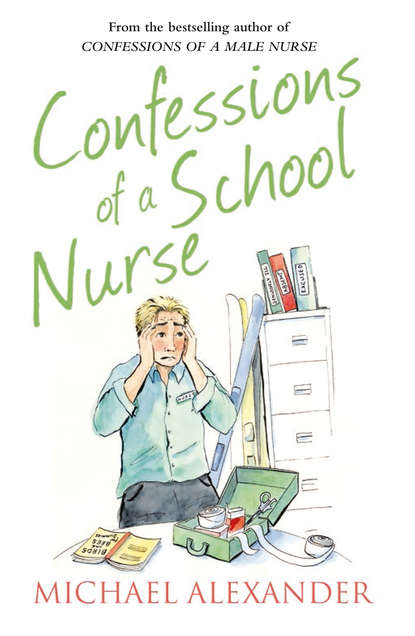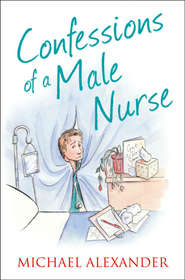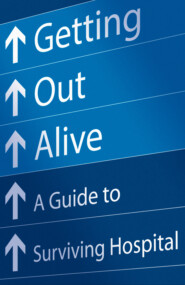По всем вопросам обращайтесь на: info@litportal.ru
(©) 2003-2024.
✖
Confessions of a School Nurse
Настройки чтения
Размер шрифта
Высота строк
Поля
‘Please, I can’t move. Don’t touch me. I can’t move.’ We couldn’t get Steve to move off the bed let alone into a car. He’d found himself in a slightly less agonising position and was not going to budge. I needed some advice.
I try to avoid calling my colleagues, Justine and Michaela, when they’re off duty because time off is supposed to be just that, and like all nurses, I know, when you ask someone for help, they will never say no. Michaela was no different and was happy to help out. In fact, Michaela relished the challenge of a decent trauma. I instantly felt reassured by her upbeat tone when she arrived.
‘Don’t worry about a thing,’ Michaela said and quickly began examining Steve’s shoulder. ‘I’ve put dozens of shoulders back in place.’ What the hell was she talking about? Nurses don’t relocate limbs. At least, not nurses in Britain or New Zealand. I knew Michaela was extremely experienced and supremely confident; perhaps this is what nurses did in the States.
‘What do you mean you’ve put in dozens of shoulders?’ I whispered, thinking I was out of earshot of our patient. ‘You can’t do that. You’re not allowed.’ I know my limits, and I know what is within the scope of my practice, and what is not. Relocating the shoulder myself had never occurred to me. Steve chose that moment to scream in pain.
‘Let her bloody fix it. I can’t take this anymore. Just do it,’ he managed to shout.
Watching someone in agony never gets any easier, and it’s a whole lot worse when you don’t have an IV line to insert with a whole lot of morphine or midazolam.
I was trying to think of what could go wrong if Michaela went ahead and fixed his shoulder. She could worsen any possible fracture or nerve damage, although there was no way to judge how much damage we could do by leaving him as he was – there were possible circulation problems to worry about – and this was without even considering the possibility of the relocation not working.
‘We can’t leave him like this for the next hour and we can’t take him to the hospital. We have no choice.’ Michaela was in total control, and not in the slightest bit fazed by the chaos. ‘Honestly, don’t worry, I’ve done this lots of times with the docs at work. It really does look like an uncomplicated dislocation. I know what I’m doing.’
I stood back and watched.
She rolled up a sheet, wrapped it around her waist and Steve’s shoulder, and gently began to pull. ‘Fuck-fuck-fuck-fuck-fuck …’ Steve’s screams reached new heights. I was just about to stop Michaela when … ‘Thank fuck for that. Oh, thank you, thank you, thank you so much.’ The relief was instant and the whole procedure over in less than ten seconds. After checking Steve’s circulation and sensation in his hand, Michaela placed him in a sling and gave him some analgesia. ‘I can’t thank you enough,’ he said repeatedly.
Part of me felt more than a little envious, the childish part that wanted to be the hero. But that was nothing to the relief I felt knowing that he was feeling so much better.
Steve was taken to the doctor the following day where an x-ray showed no fracture, and the doctor congratulated Michaela on a job well done. ‘You’re OK with us doing that?’ I asked. I had been prepared for him to be angry with us for doing something that was a doctor’s job. ‘Why would I be angry? You did a good job.’
His words were not helping me to figure out what was right or wrong (if there really was any such thing), or what my exact role was. I was doing more than the average nurse, a bit of diagnosing, and administering treatments and medicines like a doctor, as well as playing detective … but nothing as practical as what Michaela had done.
Michaela’s brave actions on that surprising Sunday night taught me a few lessons that I’ll never forget. To act or not to act? Indeed, that is the question.
Checklist (#ulink_d972540d-8cb6-58ac-9bce-13d173d29e8d)
Generally, dealing with big issues is easier, because you know it’s bad, and you know you’re going to need outside help. Perhaps that sounds odd, but there’s no uncertainty. So much of what I see is subjective, and while kids aren’t necessarily dishonest, no one is immune to playing the system.
It doesn’t matter that 95 per cent of our students are either very wealthy or ridiculously wealthy, because they’re all the same. They’re young, impressionable, tricky, manipulative, cocky, embarrassing, awkward, fun, scared, compassionate, and clever. They’re capable of anything, even fooling their favourite nurse, although I do try to catch them out when I can.
Skipping class or PE is built into their DNA, and there’s no better way to achieve this goal than to pull a sickie. After my first year on the job, I’d learned, adapted, and implemented various techniques and tactics to spot the genuine from the fakes.
1. The Positive Make-Up Test.
2. Do they have a test in class? You need to be specific with your question: kids will say ‘No’ but get in trouble for not handing in their assignment or presentation, and when confronted with this say, ‘But you asked if I had a test, not an assignment.’ I always ask the full spectrum: ‘Do you have a test, assignment, homework, presentation, or anything else in class that needs to be done today, at this moment in time?’
3. How do they answer question 2? If they start the conversation with ‘I don’t have anything important in class today’ I know where this is going. It sounds planned – and sick people are usually feeling too miserable to plan their escape.
4. Check with their dorm parent to see if they really were sick the night before.
5. Check the records to see if they’re regularly missing a particular class, PE and Maths are particularly common.
6. Obtain as much physical data as possible. Temperature, pulse, blood pressure, bowel sounds, pallor, obvious nasal congestion, lung sounds – and document it all. By tomorrow you won’t remember if they’ve had a cold for one day or one week, because you’ve seen so many students, and kids aren’t the best historians, especially when they’re lying.
Reading this back, it looks like I’m more of a detective than a nurse, but if that is so, then I’m the most lenient one around. It’s hard to say ‘no’ to a desperate kid, although I can and will when required. And that’s the problem with medical assessments – often the symptoms are subjective. It’s much easier with injuries; give me a simple break, cut or bruise anytime.
Chapter Two (#ulink_ac0c8569-0b8a-59bc-b87a-68cd9d7a12e4)
The talk (#ulink_8bf69f31-5a71-57f7-b125-4ed89e299ce8)
With children at boarding school, we end up dealing with a lot of the issues that parents usually have to deal with, and this includes relationships, hormones and sex education. We cannot ignore these issues, or hope that when the kids get home their parents give them ‘the talk’. Even the most informed parents, even those still living with their children, probably have little or even no idea about the sex lives of their kids.
How on earth can parents be expected to know what’s going on in their children’s lives when they’re thousands of miles away? I lived at home, but I still didn’t have a sex talk with my dad. One day he said, ‘You got hairy balls yet?’ and when I turned beetroot red he handed me a book. I guess it worked for me, but I feel the kids at my school probably needed a bit more than that.
So that leaves me, your average, friendly, approachable nurse, to do the job. Am I qualified? Probably not, but I have lived. Yes, those words could certainly be taken the wrong way, but it’s true. I’ve travelled, dated women from around the world, been a ski instructor and had women throw themselves at me (it’s the uniform, not me) and even been pursued by ex-psychiatric patients. Then I got married, procreated and settled down. I also spent a few months working in a London walk-in STD clinic, so I can easily use scare tactics to terrify everyone into safe sex, even abstinence. Does this make me the best person to give our kids ‘the talk’? The teachers and other faculty expect the nurses to do this, so at least they must think so, but I’ll let you be the judge …
‘What feels better, sir?’ asked William.
There’s one in every class: someone who either knows too much, or thinks they’re being clever. William was actually neither, he was simply eager.
Next to him, poor Chen had no idea what was going on. His English was good enough to learn in class, but William’s question had baffled him.
I’d never meant for the friendly chat to head in this direction. I had been asked by the dorm parents in charge of the junior school to have a relaxed, almost informal discussion with the boys one evening and talk about growing up and to maybe, very gently, bring up sex. But I’d never talked to children as young as William or Chen before. They were both twelve years old and, along with the other twenty or so boys in the room, comprised all the boys who would be starting high school next year.
‘It would be good to prepare them a little,’ Mr Jones, the head of the junior school, had explained at the start of the year, ‘so they’re not completely unprepared.’
I shouldn’t answer William’s question. It is on my list of topics to avoid at all costs. Some of the other topics on my no-go list for talks to this age group include homosexuality, masturbation, graphic descriptions of STDs and getting in-depth and intimate about sex.
Why were these very important subjects off topic? Parents. Not all parents believe it is the school’s responsibility to educate or even discuss in the most superficial manner anything regarding sex. They’re concerned for the following reasons:
1. They think their child is too young to learn about sex
2. They do not think it’s the job of the school to teach their children about sex
3. They worry that the teacher may unduly influence their child. A concern that is brought up nearly every time is homosexuality
4. They are worried that by talking about ‘safe sex’ we are encouraging their child to have sex
5. They come from places where sex is banned before marriage, and can result in imprisonment
6. Their religion does not allow it
The problem is, these kids live thousands of miles away from their parents for up to eight months a year. Some see their parents even less, as they’re sent to summer school and, over Christmas, to winter camps to ski. In all the madness of such a busy life, they never get round to having ‘the talk’. Even if they do, in an ideal world, it shouldn’t be a ‘one-off’ chat, instead an ongoing dialogue – although I haven’t found any teenager yet that wants such a painfully awkward thing to last longer than necessary.
These kids are curious; they sometimes have no idea what is going on with their bodies, or can’t explain why they feel the way they do.
Today’s talk had begun with nice safe topics – ‘relationships’, ‘trust’, ways of showing someone you liked them – but it hadn’t been enough.
‘What’s the grossest thing you’ve seen?’ asked Warren, our only Australian student. I gently reminded him it was not the time or place for that discussion.
‘Can you get AIDS your first time?’ asked João the Brazilian, his question creating quite a stir.
‘Not if you use protection,’ answered William.
‘You get it from hookers,’ said Tim, clearly a surprisingly worldly twelve-year-old.











